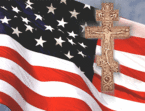Romanian Orthodox Archdiocese in America and Canada
| This article forms part of the series Orthodoxy in America | |

| |
| History | |
| American Orthodox Timeline American Orthodox Bibliography Byzantines on OCA autocephaly Ligonier Meeting ROCOR and OCA | |
| People | |
| Saints - Bishops - Writers | |
| Jurisdictions | |
| Antiochian - Bulgarian OCA - Romanian - Moscow ROCOR - Serbian Ecumenical Patriarchate: | |
| Monasteries | |
| Seminaries | |
| Christ the Saviour Holy Cross Holy Trinity St. Herman's |
St. Tikhon's St. Sava's St. Sophia's St. Vladimir's |
| Organizations | |
| Assembly of Bishops AOI - EOCS - IOCC - OCEC OCF - OCL - OCMC - OCPM - OCLife OISM - OTSA - SCOBA - SOCHA | |
| Groups | |
| Amer. Orthodox Catholic Church Brotherhood of St. Moses the Black Evangelical Orthodox Church Holy Order of MANS/CSB Society of Clerks Secular of St. Basil | |
| Edit this box | |
The Romanian Orthodox Archdiocese in the Americas is an overseas archdiocese of the Church of Romania. The Archdiocese came in existence in a restructuring of the original Romanian Orthodox Episcopate of America formed in the 1930s. The restructuring resulted from the impacts of controls placed upon the Church of Romania by the communist government that governed Romania after World War II. As in other eastern European countries at that time the communist government of Romania attempted to exert political control over elements of Romanian institutions located outside the country. As in similar situations with other Orthodox Churches with "overseas" communities, the government used the indigenous Mother Church to control the "overseas" communities. In the case of the Romanian Church, the American Episcopate was dissolved after a majority of its members would not accept directions from the communist controlled Patriarchate. Then, the new Romanian Orthodox Missionary Episcopate in America and Canada was formed with a new, patriarchate-appointed bishop.
Contents
History
Bp. Polycarp (Morusca), the ruling bishop of the Romanian Orthodox Episcopate of America had returned to Romania in 1939 to attend the meeting of the Holy Synod of the Church of Romania and was not able to return as World War II had begun. After the war he was detained by the new Communist government of Romania. In 1947, a new government law (No. 166 of 1947) dissolved the Episcopate and placed Bp. Polycarp in retirement. In 1949, another law required that leaders appointed by the Romanian Patriarchate for Romanian Orthodox communities outside Romania be approved by the government. The first hierarch appointed to lead the American Romanian Orthodox community, Bp. Antim Nica, was not accepted by the American Episcopate.
In 1950, the Romanian Orthodox Missionary Episcopate in America was chartered by a Romanian Holy Synod decision of July 12, 1950. The Romanian Patriarchate selected an American citizen, Fr. Andrei Moldovan, as the candidate for bishop to lead the new Missionary Episcopate and called him to Romania for his consecration. After his consecration in Romania, Bp. Moldovan returned to the United States and organized those parishes loyal to the new Missionary Episcopate. Subsequently, Bp. Moldovan was succeeded by Bp. Victorin.
By a decision of the Holy Synod of the Church of Romania, Decision 14079 of December 12, 1974, the Synod approved the elevation of the Missionary Episcopate to that of an Archdiocese in recognition of the elevation of the ruling bishop, Abp. Victorin, to archbishop and renewed the status of autonomy for the now Romanian Orthodox Archdiocese in America and Canada.
Organization
The current ruling hierarch for the Romanian Orthodox Archdiocese in the Americas is Archbishop Nicolae (Condrea). His see is in Chicago, Illinois.
The Romanian Orthodox Archdiocese in the Americas is a member of the Standing Conference of the Canonical Orthodox Bishops in the Americas (SCOBA).
See also
External link
Categories > Church History
Categories > Church History > Canon Law > Ecclesiology > Jurisdictions
Categories > Church History > Canon Law > Ecclesiology > Jurisdictions > Dioceses
Categories > Church History > Canon Law > Ecclesiology > Jurisdictions > Dioceses > Romanian Dioceses
Categories > OrthodoxWiki > Articles in a series
Categories > OrthodoxWiki > Incomplete articles
Categories > Places > Orthodoxy by country > Orthodoxy in America